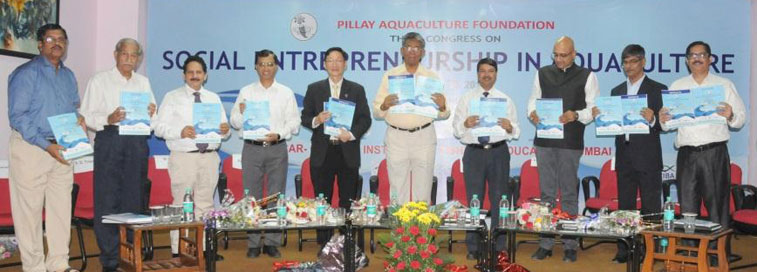
-
Central Institute of Fisheries Education, Mumbai organized the Congress on ‘Social Entrepreneurship in Aquaculture’ in collaboration with Pillay Aquaculture Foundation and Indian Fisheries Association, Mumbai from 27th to 29th April, 2016. Many government Agencies, ICAR institutes and other stakeholders participated in the Congress.
The Congress was inaugurated by Dr. Mangala Rai, former Secretary, DARE & Director General, ICAR, New Delhi and presently Vice Chancellor, GBPUA&T, Pantnagar. He highlighted the importance of water, need to understand its cost and budgeting, and role of social entrepreneurs in fisheries and aquaculture. Dr. J.K. Jena, Deputy Director General (Fisheries Science), ICAR, New Delhi presided over the function. He outlined the challenges in enhancing fish production to reach the targeted production. Dr. Gopal Krishna, Director/Vice Chancellor, ICAR-CIFE welcomed the dignitaries. In his address, he emphasized on the importance of social entrepreneurship in aquaculture. He also highlighted the role of Social Entrepreneurs having innovative ideas, passion to do good to the society and compassion for environment and equity to improve the production, processing and marketing of fish and fish products through empowering women and the poor farmers and fishermen. The objective of the Congress was to attract the attention of the policy makers and stakeholders to help in the emergence of a cadre of social entrepreneurs in aquaculture through policy support, trainings and leadership development. Theme of the Congress was presented by the Secretary PAF Dr. P. Keshavanath on behalf of the President of the PAF, Dr. V.R.P. Sinha.
Dr. Cherdsak Virapat, DG, NACA, Dr. Vishnu Swaminathan of Ashoka Innovators for the Public, Dr. S.D. Tripathi, and Dr. W.S. Lakra former Directors/Vice Chancellors CIFE were Guests of Honour, while Dr. Satyajit Mazumdar of Tata Institute of Social Sciences, Mumbai was a Special Guest. Over 250 delegates from different parts of the country as well as from abroad consisting of academia, management experts, aquaculture practitioners, policy makers and planners, administrators, NGOs and students attended the Congress. Mr. Pongpat Boonchuwong, NACA Mentor in Fisheries and Aquaculture Economics, Dr. A.S. Ninawe, former Vice Chancellor, MAFSU and Advisor DBT, Dr. S.C. Pathak, former Chief General Manager, NABARD, Dr. A.K. Singh, Director, DCFR, Bhimtal, Dr. Jitendra Sinha of SAI, Professor P.N Panday, President, ZSI, Professors B.N. Pandey, G.K. Kulkarni and Y.K. Khillare were among the notable participants.
Based on the deliberations and recommendations, it was decided to call the gist of the recommendations of the Congress given below as the ‘Mumbai Declaration to Promote Social Entrepreneurship in Aquaculture, which was unanimously adopted.
“The delegates, comprising of researchers, social entrepreneurs, practitioners and promoters, private companies, non-governmental organizations, government agencies and other participants, after having deliberated over a period of three days agreed that the identification, integration, and promotion of social entrepreneurship in government policy and programmes for aquacultures is essential for the growth of the sector in a sustainable manner and call upon state/central governments to take concrete further steps to establish, accelerate and strengthen such entrepreneurship for the benefit of all the stake holders. Governments need to create an enabling environment in the construction of infrastructure essential for ensuring ready access to physical resources, particularly marginal land for aquaculture, availability of quality water, seed, feed, breed, and mechanism for rigorous quality control, healthy product development, trading and marketing, without impairing the quality of fish and fish products. Governments should promote and propagate the development of a deeper understanding among the private industry to become environmental centric and social centric, while making sizable profit. All stake holders as well as students and researchers should be aware of the philosophy and ethics of a successful social entrepreneurship. The governments should also set up appropriate mechanism to identify in the startups the leadership quality that also should include passion to do social good and compassion for social equity and environment. Adequate institutional facilities need to be created for third party certification traceability and skill development and also to start an academic course for Social Entrepreneurship in Aquaculture and ICAR should consider establishing such facilities at CIFE, Versova, Mumbai.
Adopted on 29th April, 2016 at ICAR-CIFE, Mumbai
